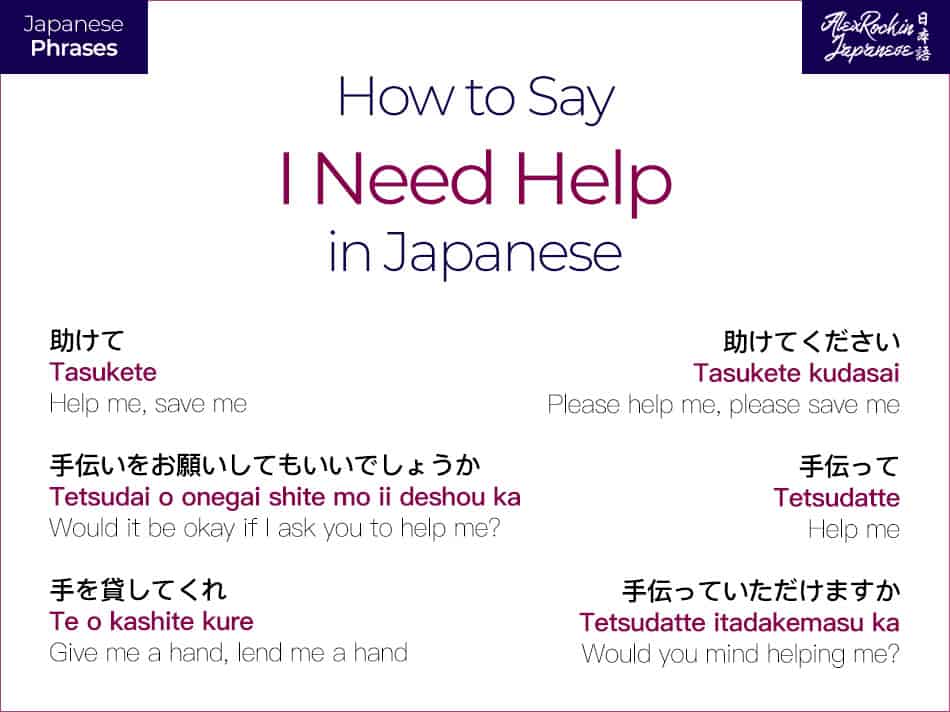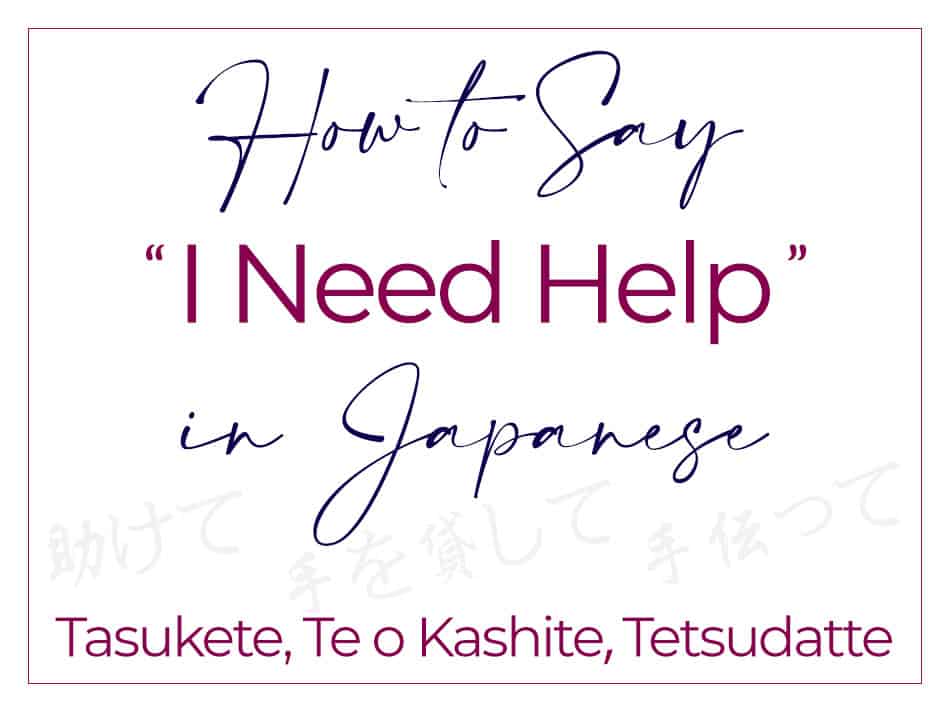Knowing how to say “I need help” in Japanese is not only a handy phrase to save some time and trouble when you are in Japan. The phrase can actually be a lifesaver and help you out of a real emergency situation. So let’s take a look at how to ask for help in Japanese.
The most basic and common phrase to say “I need help” in Japanese is “Tasukete” (助けて). It literally translates as “Help me”. If you want to say it more politely you can use the phrase “Tasukete kudasai (助けてください) which means “Please help me”. The first u is silent so it is pronounced “tas.ke.te”.
This is the simplest way to ask for help or assistance in both daily life and emergency situations and so you are good to go if you just remember this phrase. However, there are different phrases in Japanese that you can use to say “I need help” and depending on the situation some are more suitable than others. So read on if you want to know more common phrases and when to use them.
How to Say “I Need Help” in Japanese

We have just learned that “Tasukete” or the more polite version “Tasukete kudasai” is the most basic and easiest way to say “I need help” in Japanese. However, it sounds like you are in (big) trouble and you need help immediately.
That’s why “Tasukeru” is not the most suitable word when you would just like to have some help with a less urgent task or a simple chore. The phrases are also not appropriate or polite enough when you need help from your boss or senior at work.
So here are some alternative phrases with an explanation of when to use them.
“I need help” in Japanese
- Tetsudatte / Tetsudatte kudasai
Use this phrase when you need help with a simple task or chore - Te o kashite kure
Use this phrase when asking a good friend for help - Tetsudatte itadakemasu ka?
Use this phrase when you want to sound very polite - Tetsudai o onegai shite mo ii deshou ka?
Use this phrase when asking your boss or senior for help
The Kanji, Kana, meanings, and detailed explanations for all of the phrases you can find in the next section.
10 Common Phrases You Can Use to Ask For Help
1. Tasukete
Tasukeru (助ける) is the Japanese word for “to help”, “to rescue”, or to “assist”. Tasukete (助けて) is the te-form of the verb and means “Help!” or “Help me“. As I mentioned before it can be used when you need a hand with something important or when you are in trouble.
Since the phrase sounds a bit direct and/or urgent you will hear tasukete more often in casual conversations with friends or in emergency situations. In the latter situation, it can also be translated as “Save me!” or “Rescue me!“. If you are into anime or manga I’m pretty sure you have heard or seen this phrase before.
助けて
Kana: たすけて
Romaji: Tasukete
Translation: Help, help me, save me, rescue me
2. Tasukete Kudasai
We just talked about tasukete and learned that it means “Help!”. Kudasai (ください) is the Japanese word for “please” and adding it to the end of a sentence or request makes it sound more polite. So instead of “Help me” you are using the more polite and more formal version “Please help me“.
Since tasukete usually sounds a bit too casual I recommend your remember the phrase Tasukete kudasai (助けてください) and use it whenever you need help from staff or strangers. The only exception to this is in an emergency situation, of course. When you are in a critical situation there is no need and usually also no time for long and complicated phrases. So you can just scream “Tasukete!!!!”.
助けてください
Kana: たすけて ください
Romaji: Tasukete kudasai
Meaning: Please help me, please save me, please rescue me
3. Tasukete Hoshii
Among all the basic Japanese phrases this one is probably the closest to expressing “I need your help”. Hoshii (欲しい) means “wanted” or “in need for” after the te-form of a verb it usually means “I want you to …” or “I need you to …”. So Tasukete hoshii (助けて欲しい) translates as “I want you to help me” or “I need you to help me“. Hence, “I need your help” if you translate it less directly.
助けて欲しい
Kana: たすけて ほしい
Romaji: Tasukete hoshii
Meaning: I need you to help, I want you to help me
4. Tetsudatte
The next set of phrases uses the verb Tetsudau (手伝う). It is another Japanese word for “to help”, “to assist”, or “to aid”, but compared to Tasukeru it sounds less urgent and you can use it when you need help with one thing or simple chores such as cooking, cleaning, washing the dishes, etc.
Tetsudatte (手伝って) is the verb’s te-form and means “Help me“.
手伝って
Kana: てつだって
Romaji: Tetsudatte
Meaning: Help me
5. Tetsudatte Kudasai
Same as before you can make your request politer by adding Kudasai (ください) to the end of the sentence. So Tetsudatte kudasai (手伝ってください) means “Please help me“.
手伝ってください
Kana: てつだって ください
Romaji: Tetsudatte kudasai
Meaning: Please help me
6. Te o Kashite Kure
Te o kasu (手を貸す) is the Japanese phrase for “to give someone a hand” or “lend someone a hand”. Te (手) means “hand” and Kasu (貸す) means “to lend”. When you conjugate the verb to Te o kashite (手を貸して) you get the phrase “Give me a hand” or “Lend me a hand“.
You don’t even have to use Kure (くれ) which comes from the verb Kureru (くれる) meaning “to do for someone” or “to take the trouble to do”. However, when you add it at the end of your request it seems a little bit softer.
手を貸してくれ
Kana: て を かして くれ
Romaji: Te o kashite kure
Meaning: Give me a hand, lend me a hand
7. Te o Kashite Kudasai
When you use Kudasai instead of Kure you will make the request politer. So Te o kashite kudasai (手を貸してください) becomes “Please give me a hand” or “Please lend me a hand“. This is another very useful phrase when asking someone for help or for a favor but it might a bit more difficult to remember than Tasukete kudasai.
手を貸してください
Kana: て を かして ください
Romaji: Te o dashite kudasai
Meaning: Please give me a hand, please lend me a hand
8. Tetsudatte Itadakemasu ka?
Now we will learn some really polite phrases. You still remember Tetsudau and Tetsudatte from before, right? Itadakemasu (いただけます) is similar to Kure but it is more humble and means “can get someone to do something”.
The full phrase Tetsudatte itadakemasu ka (手伝っていただけますか) means “Would you mind helping me?” or “Could you help me, please?“.
手伝っていただけますか
Kana: てつだって いただけます か
Romaji: Tetsudatte itadakemasu ka
Meaning: Would you mind helping me?, Could you help me, please?
9. Tetsudai o Onegai Shite mo ii Deshou ka?
As you can already tell by the length of it this phrase this is very, very, very polite. I think explaining all of the words might be a bit too much for this post so let’s just go over it quickly. Tetsudai (手伝い) means “help” and Onegai shite mo ii deshou ka (お願いしてもいいでしょうか) means “Would it be okay if…”.
The whole phrase 手伝いをお願いしてもいいでしょうか (Tetsudai o onegai shite mo ii deshou ka) means “Would it be okay if I ask you to help me?”. If you work in a Japanese company you can use this phrase to ask your boss or senior for help.
手伝いをお願いしてもいいでしょうか
Kana: てつだい を おねがい して も いい でしょう か
Romaji: Tetsudai o onegai shite mo ii deshou ka
Meaning: Would it be okay if I ask you to help me?
10. Herupu o Kudasai
The last phrase I want to teach you is not the most natural one but a very easy and useful survival phrase. Japanese love to use English words and so you can also use the Japanese loanword for “help” which is Herupu (ヘルプ). It is exactly the same word but with a Japanized pronunciation.
Herupu o kudasai (ヘルプをください) can be translated as “Help, please” or “Help me, please”.
While the phrase is correct, I have to honestly tell you that I have never heard any of my friends or colleagues say this before. I would also use it more in a fun than a serious way, but I think for foreign visitors who don’t speak any Japanese and just want to know some basic phrases this is probably one of the easiest phrases to remember.
ヘルプをください
Romaji: Herupu o kudasai
Meaning: Help, please; help me, please
Summary of How to Say “I Need Help” in Japanese
Here’s is an image with the most important phrases and below you can find an overview of all the phrases we have discussed today. As I said before there are many more phrases you can use to say “I need help” in Japanese, but the ones we have covered will help you in all common situations. If I should write another article about the same topic I will link it here.
| Tasukete 助けて | Help me! Save me! Rescue me! | casual |
| Tasukete kudasai 助けてください | Please help me! Please save me! Please rescue me! | polite |
| Tasukete hoshii 助けて欲しい | I need you to help me I want you to help me | politer |
| Tetsudatte 手伝って | Help me | casual |
| Tetsudatte kudasai 手伝ってください | Please help me | polite |
| Te o kashite kure 手を貸してくれ | Give me a hand Lend me a hand | casual |
| Te o kashite kudasai 手を貸してください | Please give me a hand Please lend me a hand | politer |
| Tetsudatte itadakemasu ka 手伝っていただけますか? | Would you mind helping me? Could you help me, please? | very polite |
| Tetsudai o onegai shite mo ii deshou ka 手伝いをお願いしてもいいでしょうか | Would it be okay if I ask you to help me? | very polite |
| Herupu o kudasai ヘルプをください | Help, please I need help | polite |
Hopefully, you won’t need these phrases too often, but now you know how to ask for help in Japanese! Good luck with your trip, work, or further studies!


